No. 70
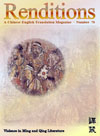
|
(Autumn 2008)
Violence in Ming and Qing Literature
The 2008 Autumn issue (No. 70) has as its theme violence in Ming and Qing dynasty literature. The translated texts span a period from early Ming to late Qing and include vernacular and classical fiction, drama, memoirs, and poetry. The subject matter and mood range from the horrific to the bawdy, from the supernatural to historical documentation, and from gruesome to grotesque. Themes include justice and injustice, revenge, rape, war and a hen-pecked husband.
Table of
contents
Order
|
No. 69
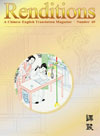
|
(Spring 2008)
This is the 35th anniversary issue of Renditions with an article dedicated to our founding editor, George Kao, who passed away on 1 March 2008. This issue features several translations related to performance and theatre: a late Ming or early Qing dynasty drum ballad, which is a rare example of a fully-developed animal fable, a nineteenth century 'flower guide' appraising the qualities of boy-actors, a one-act play by Ding Xilin involving cross-dressing, and poems by Wen Yiduo about a drummer and a balladeer. For the first time Renditions presents translations into Scots, which is used for two Wen Yiduo poems originally written in vernacular Pekinese. Other items include prose sketches by Wang Anyi, a short story by Xi Xi and poetry by P. K. Leung.
Table of contents
Order
|
No. 68
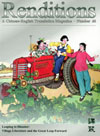
|
(Autumn 2007)
Leaping to Diaster: Village Literature and the Great Leap Forward
This collection presents opposing pictures of rural China during the Great Leap Forward (1958-1960), the grand delusion that led to the worst famine of the 20th century. Stories and poems written at the time express boundless, if ill-founded, optimism for a communist utopia. Two decades later, fiction about its aftermath reveals its tragic impact on the peasantry. Set against the backdrop of inflated propaganda and immense hardships are tales of heroism, romance and disillusionment.
Table of
contents
Order
|
No. 67
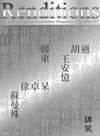
|
(Spring 2007)
Modern Chinese Fiction: Examples of Its Evolution
Directed by political discourse and framed by school and university syllabi, 'Modern Chinese Literature' has always been presented as the fruit of an abrupt break with tradition. The validity of such a representation is now in question. Featuring examples of Chinese fiction written in the last nine decades, this issue reveals the diverse elements that contributed to the genre's development, particularly in terms of narrative structure and voice.
Table of
contents
Order
|
No. 66
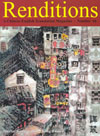
|
(Autumn 2006)
Hong Kong Essays
Hong Kong is perhaps best represented by the essay, a form that has flourished and taken on a uniquely local flavour, especially in the last half-century. This special section includes some of the most notable works from the last half-century by a diverse group of writers. Renditions, itself a Hong Kong institution, provides here a glimpse into the ever-changing society of this vibrant city. A selection of classical poetry rounds out the issue.
Table of
contents
Order
|
No. 65
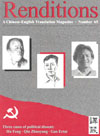
|
(Spring 2006)
Three cases of political dissent
Hu Feng, Qin Zhaoyang and Gao Ertai were three of the many intellectuals labelled Rightists during the Anti-Rightist movement of 1957. In the biographical writing, memoirs, and interview in this issue, they reflect on their experiences during these years of persecution and hard labour that lasted until the end of the Cultural Revolution.
Table of
contents
Order
|
No. 64
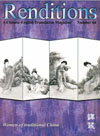
|
(Autumn 2005)
Women of traditional China
Liang Qichao claimed that traditional Chinese women were no more than dependents of men who never engaged in productive labour. The writings in this issue, covering topics from education to literary accomplishments, and from service at court to widowhood, prove him soundly wrong.
Table of
contents
Order
|
No. 63
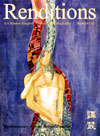
|
(Spring 2005)
Contemporary Fiction: Marginal Worlds
Featuring short stories by writers from mainland China, Taiwan and Hong Kong, this issue takes a look at life lived on the margin and at the edge.
Table of
contents
Order
|
No. 62
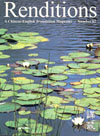
|
(Autumn 2004)
Different genres of work by the Song-dynasty writer Lu You, excerpts from the 19th-century novel The Strange Case of Nine Murders by Wu Woyao, and classical poetry by the scholar Yeh Chia-ying.
Table of
contents
Order
|
No. 61
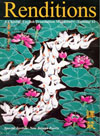
|
(Spring 2004)
Special Section: New Taiwan Poetry
Thirty-four established as well as young emerging poets representing the latest trends in New Poetry from Taiwan are included. The issue also contains a modern short story, Buddhist homilies and two classical letters.
Table of
contents
Order
|
| |
|





